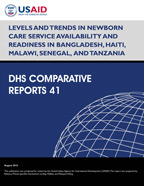
Abstract:
This study examines levels and trends in two
dimensions of newborn care quality—service
availability and service readiness—in
Bangladesh, Haiti, Malawi, Senegal, and
Tanzania, the five USAID maternal and child
health (MCH) priority countries with Service
Provision Assessment (SPA) surveys conducted
since 2011. In each country, key services,
commodities, and medicines needed for
comprehensive delivery and newborn care were
missing from a large proportion of facilities
that offer normal delivery services. Of the
three domains of service availability
examined, scores for routine care
availability are consistently highest, and
scores for newborn signal function
availability are lowest. Of the four domains
of service readiness examined, scores for
general requirements and equipment are
consistently highest, while scores for
guidelines and staffing are lowest. Both
service availability and service readiness
tend to be highest in hospitals and in urban
areas, pointing to substantial equity gaps in
the quality of newborn care. In Tanzania,
where two SPA surveys were conducted
recently, in 2006 and 2014-15, all measurable
domains of newborn care service availability
and readiness showed significant improvement
between surveys, and urban-rural and public-
private quality gaps narrowed. In conclusion,
we found some encouraging evidence of newborn
care service availability and readiness among
the countries studied, but we also identified
a great deal of room for improvement. The
findings indicate the need for broad
initiatives that improve staff competence,
address systemic barriers to service
provision, and promote equity in newborn care
quality.
 Levels and Trends in Newborn Care Service Availability and Readiness in Bangladesh, Haiti, Malawi, Senegal, and Tanzania (PDF, 1196K)
Levels and Trends in Newborn Care Service Availability and Readiness in Bangladesh, Haiti, Malawi, Senegal, and Tanzania (PDF, 1196K)
